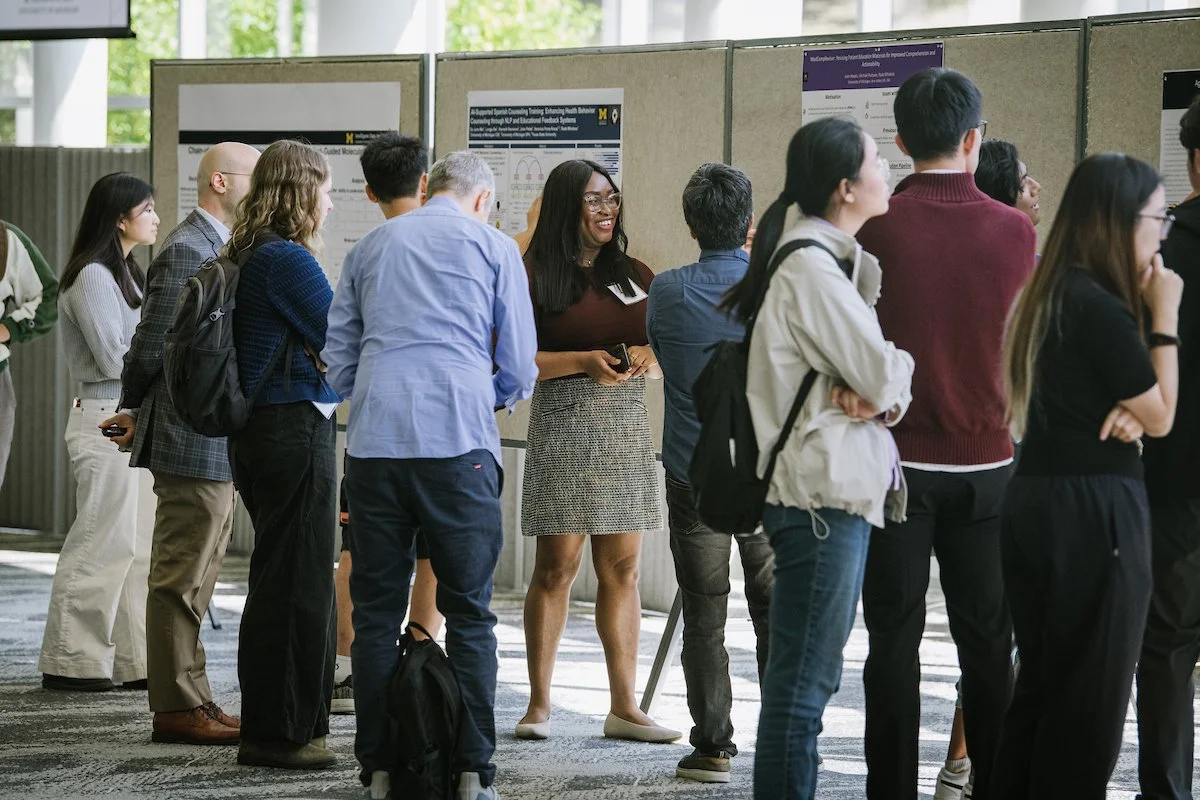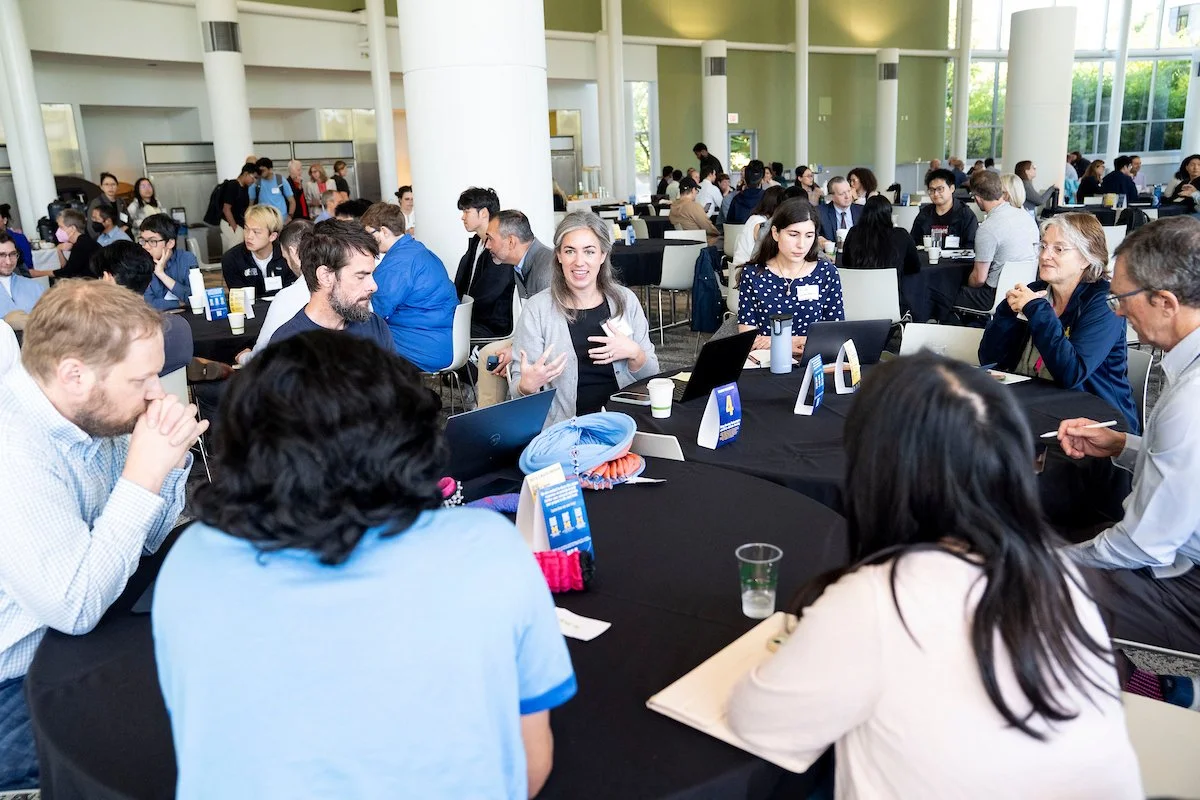Recap: The 2025 AI & Health Symposium
(Left) Symposium keynote speaker Dr. Marinka Zitnik presents to attendees. (Right) Attendees discuss the research projects on display during the symposium’s poster session. Photos provided courtesy of e-HAIL.
Investigators across disciplines met for a showcase and celebration of AI and healthcare-focused research at U-M.
ANN ARBOR, MI – On September 12, 2025, around 250 members of the University of Michigan research community gathered for the 4th annual AI & Health Symposium. Hosted jointly by e-Health and Artificial Intelligence (e-HAIL) and AI & Digital Health Innovation (AI&DHI), with support from the Institute for Healthcare Policy and Innovation (IHPI), the symposium drew investigators from across departments and disciplines eager to forge new collaborations and learn more about the work taking place where AI and healthcare meet at U-M.
The symposium kicked off with an introduction from Dr. Eric Michielssen, Associate Dean for Research at the College of Engineering and Louise Ganiard Johnson Professor of Electrical Engineering and Computer Science. Dr. Michielssen spoke about the tradition that the symposium has become and how the resources and infrastructure provided through the e-HAIL and AI&DHI collaboration has set U-M apart in the AI and health research space.
“The College of Engineering has been, for many years now, a very strong supporter of AI&DHI as well as e-HAIL, and I’m very pleased to see this collaboration strengthen,” said Dr. Michielssen. “The goal of what is now called AI&DHI was to grow a set of shared data and compute resources to accelerate innovation in this space, and it has been a huge boon for campus. We remain unique nationwide in that we have these data and compute resources available to our researchers, and this initiative has delivered quantifiable positive impact to Michigan Medicine patients at the bedside.” Noting that interdisciplinary collaborations take effort, time, and mutual appreciation of the importance of technical and clinical insights, Dr. Michielssen likewise recognized the value of e-HAIL as a core community that connects AI researchers with biomedical and clinical researchers to go after the hard problems.
After the introduction, Dr. Rada Mihalcea, Co-Lead Convenor of e-HAIL and Janice M. Jenkins Collegiate Professor of Computer Science and Engineering, emceed the symposium’s first session: the “Lightning Talks.” This segment highlighted the work of four early-career U-M faculty conducting impactful research in AI and health. The researchers selected to present at the 2025 symposium, and their topics, were as follows:
The four Lightning Talk presenters with Dr. Rada Mihalcea during the post-talk Q&A session. (From left) Liyue Shen, Alexander Rodriguez, Rada Mihalcea, Keith Feldman, and Yixin Wang.
Keith Feldman, PhD, Associate Professor of Learning Health Sciences – A Quest for Context: Computational Methods to Improve the Way We Represent and Utilize Patient Data”
Alexander Rodriguez, PhD, Assistant Professor of Electrical Engineering and Computer Science – “Integrating AI and Science-Based Models in Health”
Liyue Shen, PhD, Assistant Professor of Electrical and Computer Engineering – “Dynamic Modeling of Patients, Modalities, and Tasks via Multi-modal Multi-task Mixture of Experts”
Yixin Wang, PhD, Assistant Professor of Statistics – “Causal Inference with Unstructured Data”
Following the Lightning Talks, symposium attendees had their choice of 16 discussion tables as part of the “Tabletop Discussions: Research and Resources” session. For the research-focused tables, topics ranged from applications of AI in maternal and fetal health to using sensing technologies and AI for autistic thriving. Resource-focused tables featured discussions around positioning one’s work for external funding and broader reach as well as strategies for academic researchers looking to in collaborate with industry.
“Personal connection has remained an important hallmark of this event since the very beginning,” said Dr. Henrike Florusbosch, Program Manager for e-HAIL. “These discussion tables have served as the starting point for many new collaborations as investigators meet others with similar research interests and different areas of expertise that can augment and accelerate joint projects.”
AI & Health Symposium attendees gathered at 16 discussion tables to talk research and resources. Photo provided courtesy of e-HAIL.
After lunch, the symposium’s afternoon session kicked off with a presentation from keynote speaker Dr. Marinka Zitnik, Associate Professor of Biomedical Informatics at Harvard Medical School. In her talk, Dr. Zitnik discussed a series of advanced AI models that operate at four biological scales—molecular, cellular, therapeutic and at the patient level—effectively paving the way toward what Dr. Zitnik referred to as “AI scientists,” systems that reason skeptically, integrate multimodal data, and interface with experimental platforms to learn and innovate autonomously.
Following the keynote was a series of eight video presentations in which U-M research teams—many of whom were also in attendance—shared what they were working on with the aim of sparking interest and potential collaborative opportunities with symposium guests.
The symposium’s final segment featured a panel discussion focused on helping researchers find funding opportunities beyond federal sources. The panel was comprised of experts in research relations, business development, and corporate and foundation relations including:
(From left) Dr. Henrike Florusbosch, Michael Ranella, Colleen Sherman and Christine Muchanic.
Photo provided courtesy of e-HAIL.
Christine Muchanic, MA, Senior Director of Research Relations at the College of Engineering
Michael Ranella, MBA, MPH, Senior Director of Business Development at Fast Forward Medical Innovation (FFMI)
Colleen Sherman, Director of Corporate and Foundation Relations at the Michigan Medicine Office of Development
“The AI & Health symposium began as a way of connecting AI health researchers broadly from across the University to create a community under a shared vision and image,” said Dr. Mihalcea. “Our initial community of AI and medical practitioners started out very small, but, as we can see today, has grown multiple times over, demonstrating how much AI and healthcare play a role in creating a network across disciplines to advance their research.”
“In 2022, when the first AI & Health symposium was held, we realized then that AI would become increasingly important in healthcare and that existing services at U-M could be leveraged to position this institution as a premier hub for AI research,” said Dr. Steve Kunkel, Executive Vice Dean for Research at the U-M Medical School, Chief Scientific Officer of Michigan Medicine and Peter A. Ward Distinguished University Professor and Endowed Professor of Pathology Research. “We are pleased to see the results of these investments. U-M’s combined strengths really position us to lead in this space, and I couldn’t be more excited to see what the future is going to bring.”
“In 2022, when the first AI & Health symposium was held, we realized then that AI would become increasingly important in healthcare and that existing services at U-M could be leveraged to position this institution as a premier hub for AI research. We are pleased to see the results of these investments. U-M’s combined strengths really position us to lead in this space, and I couldn’t be more excited to see what the future is going to bring.”
About AI & Digital Health Innovation
AI & Digital Health Innovation (formerly Precision Health at U-M) is dedicated to empowering researchers at the University Michigan to change the future of digital healthcare. They work with multi-disciplinary teams of health providers, basic scientists, engineers, and administrators to tackle the most difficult research problems and help rapidly bring ideas to the bedside. For more information visit aidhi.umich.edu.
About e-Health and Artficial Intelligence (e-HAIL)
The e-Health and Artificial Intelligence (e-HAIL) program is a joint effort with sponsorship from the Offices of Research in the College of Engineering and the Medical School. Connecting and supporting faculty dyads is at the core of their work. Our vision is to enable technological breakthroughs in core AI methodologies that have a positive impact on the health of individuals and populations, within healthcare systems and beyond, both in the US and globally. For more information, visit https://e-hail.umich.edu/.





